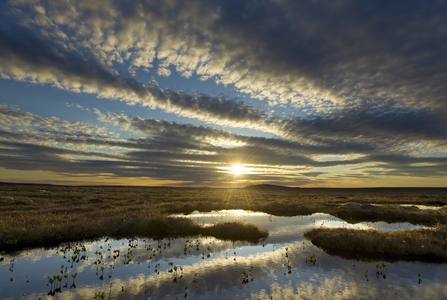
Peat © Mark Hamblin 2020VISION

Peat © Mark Hamblin 2020VISION
The UK Government has announced its intention to ban the sale of peat to amateur gardeners by 2024. It is understood that this ban will apply to bagged peat compost, but it not yet clear whether peat-containing products, such as plants, will also be subject to a 2024 ban. The ban follows a public consultation, which ran from December 2021 to March 2022, and marks the first occasion that any UK government has considered legislative action to tackle the use of peat in horticulture.
The Wildlife Trusts, alongside key nature charities, have campaigned for an end to the needless destruction of one of the UK’s most precious wildlife habitats since the 1990s. Peatlands have a global cooling effect when they are in their naturally wet state, and lock away carbon from dead plants for hundreds or even thousands of years. However, when peatlands are drained and dug up for use in gardens and greenhouses, stored carbon is released in the form of CO2 (carbon dioxide).
Some uses of peat will remain legal beyond 2024, and so it is important to recognise that while Defra’s proposed ban targets a chunk of the UK peat market, it does not eliminate peat use entirely, nor does it directly address the issue of peat extraction.
The Wildlife Trusts estimate that peat extraction for horticulture has caused up to 31 million tonnes of CO2 to be released since 1990.
Stephen Trotter, CEO of Cumbria Wildlife Trust said:
“This is welcome news and the ban can’t come soon enough for the very special wildlife that lives on and in bogs and peatlands. We’ve been waiting for a very long 40 years for the Government to take effective action and bring to an end the damaging extraction of peat in England alongside peat imports from other countries.”
“Even now, this is not a total ban – and we call on the Government to introduce a total ban on the use of peat in the horticultural trade as well its sale to the general public. Peat imports from elsewhere in Europe must also be banned to stop the ‘export’ of our damaging activities to other countries.”
Stephen added: “In the four decades since our campaign began, many of Cumbria’s precious lowland peatlands have either been destroyed completely or are now in a severely damaged state. This has had a destructive and terrible impact on wildlife and the environment – and has added to the climate emergency.“
“Cumbria Wildlife Trust and our partners in the Cumbria Peat Partnership are working hard to restore damaged peatlands around Cumbria. In the last seven years, we’ve put around 6000ha of damaged bog into recovery. Indeed, several of the former peat extraction sites on the Solway and around Morecambe Bay are now managed as nature reserves but they will take thousands of years to recover and return to their former glory!
“Astonishingly and contrary to UK Government policy, there is still a large peat extraction site operating in North Cumbria although it is not clear whether this site will be affected by the new ban in 2024.”
“In the meantime, gardeners don’t have to wait until 2024 – there are plenty of successful alternatives to peat, so why not make the switch to peat-free compost immediately, if you haven’t done so already? You could also ask your garden centre or provider of pot-grown plants to confirm that their plants are not grown in peat – and if they are, go elsewhere!”
List of garden centres in Cumbria that currently stock peat-free compost.

Spagnum moss © Mark Hamblin 2020VISION
In the run up to COP15, the UN Biodiversity Conference due to take place later this year, the UK Government led with ambitious calls to protect nature, including putting an end to biodiversity loss globally, and protecting at least 30% of land and seas, by 2030.
Following this announcement, the UK Government is in a stronger position to push for ambitious negotiations at COP15.
The Wildlife Trusts are calling upon the UK Government to:
The importance of peatlands to our natural world has been understood for decades, and awareness of the issues this special habitat faces has only increased. This announcement from Defra symbolises long-awaited, decisive action which will help to reverse species decline and to address the fact that a huge 4% of the UK’s total annual greenhouse gas emissions now come from degraded peatlands.
The announcement also sends a clear signal to growers and retailers that it is time to change. After target dates for the voluntary phase-out of peat were repeatedly missed, plans for a ban were first outlined by the UK Government in 2021. Retailers now have until 2024 to phase out the sale of peat ahead of the Government mandate.
The Wildlife Trusts have campaigned on this issue for years – and welcome today’s news. However, ambition must be increased in order to bring about an end to all uses of peat – with no exemptions. In doing so, the UK Government has the opportunity to embolden other nations to do the same and to demonstrate global leadership on nature and climate.